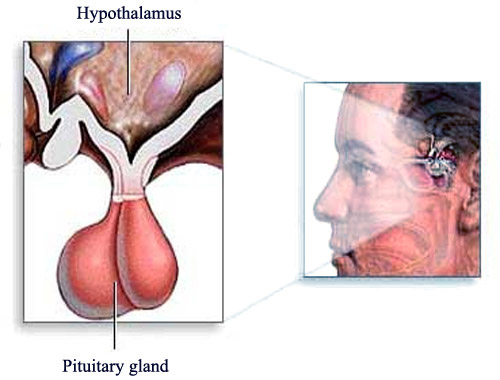Hyperprolactinemia

Published: 18 Jun 2025
ICD9: 253.1 ICD10: E22.9 ICD11: 5A60.1
Hyperprolactinemia is a condition in which a person has higher-than-normal levels of the hormone prolactin in the blood.
Here's a breakdown of what that means and why it matters:
![]() Prolactin: This is a hormone primarily produced by the pituitary gland, a small gland at the base of the brain. Its main function is to stimulate milk production (lactation) in pregnant and postpartum women. It also plays a role in sexual function and reproduction.
Prolactin: This is a hormone primarily produced by the pituitary gland, a small gland at the base of the brain. Its main function is to stimulate milk production (lactation) in pregnant and postpartum women. It also plays a role in sexual function and reproduction.
![]() Hyper-: Means "above" or "excessive".
Hyper-: Means "above" or "excessive".
![]() -emia: Means "in the blood".
-emia: Means "in the blood".
Causes of Hyperprolactinemia:
Hyperprolactinemia can be caused by a variety of factors, including:
![]() Prolactinomas: These are non-cancerous tumors of the pituitary gland that produce excess prolactin. This is the most common cause.
Prolactinomas: These are non-cancerous tumors of the pituitary gland that produce excess prolactin. This is the most common cause.
![]() Certain Medications: Some medications, especially antipsychotics, antidepressants, and certain blood pressure medications, can increase prolactin levels.
Certain Medications: Some medications, especially antipsychotics, antidepressants, and certain blood pressure medications, can increase prolactin levels.
![]() Other Pituitary Tumors or Conditions: Tumors near the pituitary gland can sometimes interfere with its function and lead to increased prolactin production.
Other Pituitary Tumors or Conditions: Tumors near the pituitary gland can sometimes interfere with its function and lead to increased prolactin production.
![]() Hypothyroidism: An underactive thyroid gland can sometimes cause elevated prolactin levels.
Hypothyroidism: An underactive thyroid gland can sometimes cause elevated prolactin levels.
![]() Kidney Disease: Chronic kidney disease can affect prolactin clearance from the body.
Kidney Disease: Chronic kidney disease can affect prolactin clearance from the body.
![]() Liver Disease: Similar to kidney disease, liver disease can impair prolactin processing.
Liver Disease: Similar to kidney disease, liver disease can impair prolactin processing.
![]() Stress: Physical or emotional stress can sometimes lead to temporary increases in prolactin.
Stress: Physical or emotional stress can sometimes lead to temporary increases in prolactin.
![]() Nipple Stimulation: Frequent or prolonged nipple stimulation can increase prolactin levels.
Nipple Stimulation: Frequent or prolonged nipple stimulation can increase prolactin levels.
![]() Chest Wall Injuries or Surgery: Trauma to the chest wall can sometimes stimulate prolactin release.
Chest Wall Injuries or Surgery: Trauma to the chest wall can sometimes stimulate prolactin release.
![]() Idiopathic Hyperprolactinemia: In some cases, the cause of hyperprolactinemia is unknown (idiopathic).
Idiopathic Hyperprolactinemia: In some cases, the cause of hyperprolactinemia is unknown (idiopathic).
Symptoms of Hyperprolactinemia:
Symptoms can vary depending on the cause and severity of the condition.
In Women:
![]() Irregular or absent menstrual periods (amenorrhea)
Irregular or absent menstrual periods (amenorrhea)
![]() Difficulty getting pregnant (infertility)
Difficulty getting pregnant (infertility)
![]() Galactorrhea: Production of breast milk when not pregnant or breastfeeding
Galactorrhea: Production of breast milk when not pregnant or breastfeeding
![]() Decreased libido (sex drive)
Decreased libido (sex drive)
![]() Vaginal dryness
Vaginal dryness
![]() Headaches
Headaches
![]() Vision problems (if caused by a large pituitary tumor)
Vision problems (if caused by a large pituitary tumor)
In Men:
![]() Decreased libido (sex drive)
Decreased libido (sex drive)
![]() Erectile dysfunction
Erectile dysfunction
![]() Gynecomastia: Enlargement of breast tissue
Gynecomastia: Enlargement of breast tissue
![]() Infertility
Infertility
![]() Headaches
Headaches
![]() Vision problems (if caused by a large pituitary tumor)
Vision problems (if caused by a large pituitary tumor)
![]() Galactorrhea (rare)
Galactorrhea (rare)
Diagnosis:
Hyperprolactinemia is usually diagnosed through a blood test to measure prolactin levels. If levels are elevated, further testing may be done to determine the underlying cause, such as:
![]() Repeat prolactin tests
Repeat prolactin tests
![]() Thyroid function tests
Thyroid function tests
![]() Kidney and liver function tests
Kidney and liver function tests
![]() MRI of the pituitary gland
MRI of the pituitary gland
Treatment:
Treatment depends on the cause of the hyperprolactinemia:
![]() Medication: Dopamine agonists (e.g., bromocriptine, cabergoline) are commonly used to lower prolactin levels. These medications can also shrink prolactinomas.
Medication: Dopamine agonists (e.g., bromocriptine, cabergoline) are commonly used to lower prolactin levels. These medications can also shrink prolactinomas.
![]() Surgery: In some cases, surgery may be necessary to remove a pituitary tumor.
Surgery: In some cases, surgery may be necessary to remove a pituitary tumor.
![]() Radiation Therapy: Rarely used, but may be an option if medication and surgery are not effective.
Radiation Therapy: Rarely used, but may be an option if medication and surgery are not effective.
![]() Observation: If the hyperprolactinemia is mild and not causing significant symptoms, a doctor may recommend monitoring the condition without treatment.
Observation: If the hyperprolactinemia is mild and not causing significant symptoms, a doctor may recommend monitoring the condition without treatment.
![]() Addressing the Underlying Cause: If the hyperprolactinemia is caused by medication or another medical condition, addressing that underlying cause may help to lower prolactin levels.
Addressing the Underlying Cause: If the hyperprolactinemia is caused by medication or another medical condition, addressing that underlying cause may help to lower prolactin levels.
When to See a Doctor:
If you are experiencing any of the symptoms of hyperprolactinemia, it's important to see a doctor for evaluation and diagnosis. Early diagnosis and treatment can help to prevent complications and improve quality of life.
In summary, Hyperprolactinemia is a condition of having abnormally high levels of prolactin in the blood, which can cause a variety of reproductive and other health problems in both men and women. It is important to seek medical advice for proper diagnosis and management.